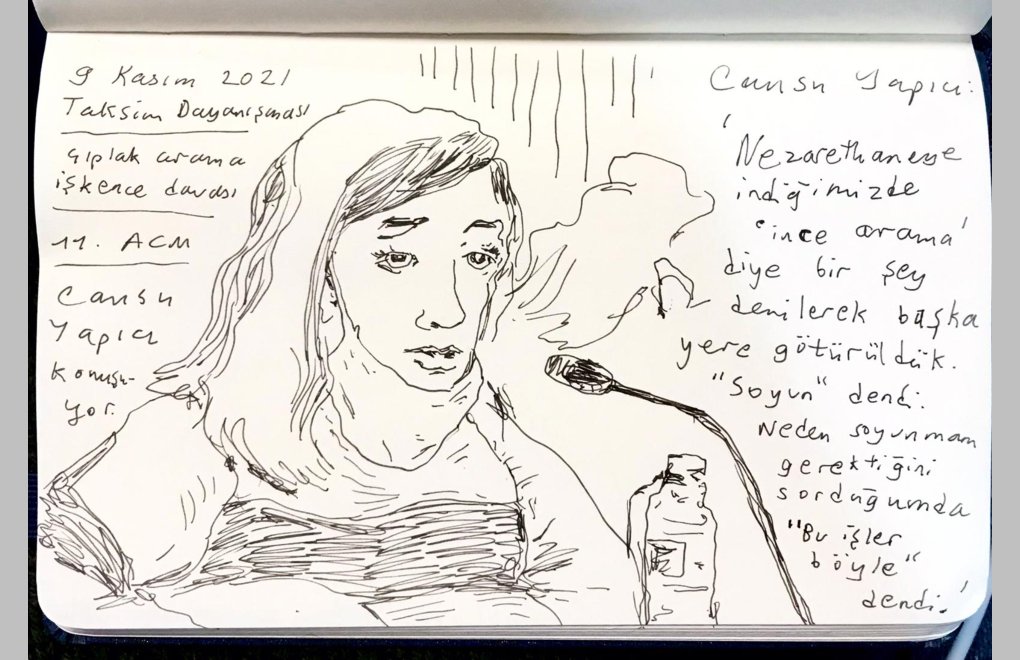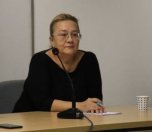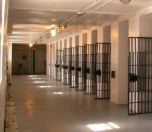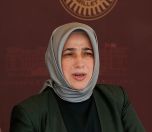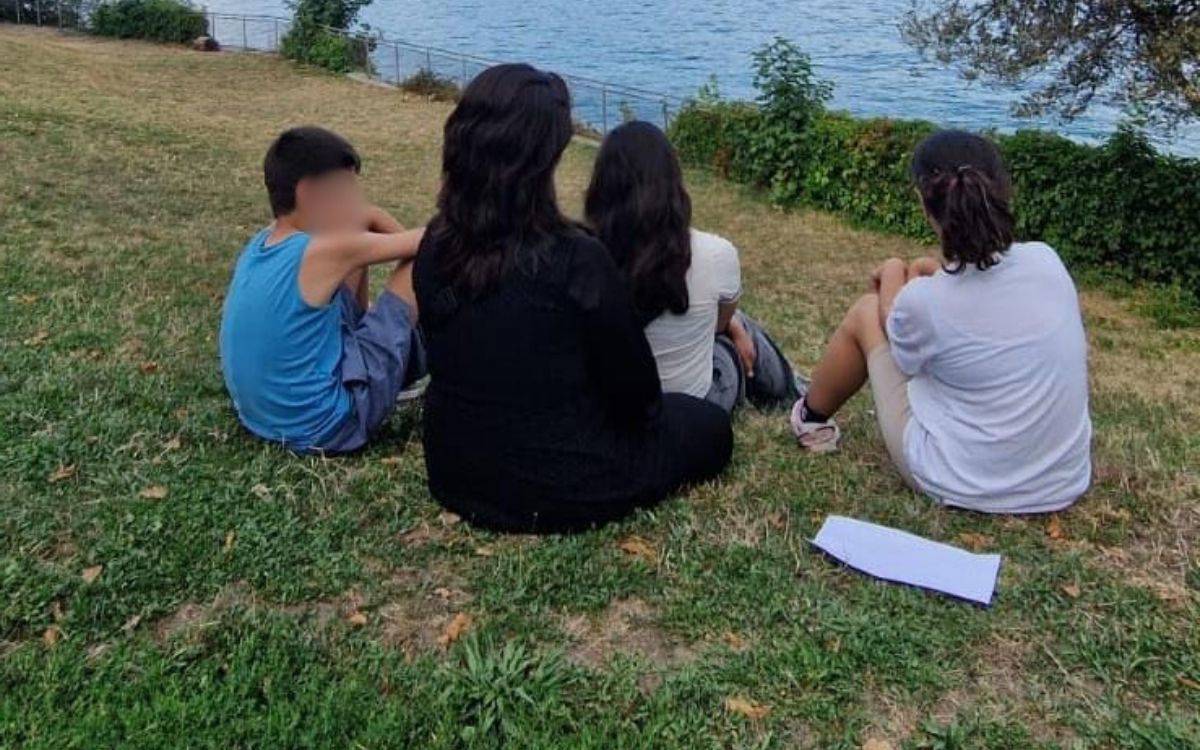Drawing: Nazım Dikbaş
Click to read the article in Turkish / Kurdish
"Harassments first started in the detention vehicle. Especially my young women friends experienced grave things. Strange words were said while their brothers were outside looking at them.
"With regards to my age, they said things like 'You have one foot in the grave, what are you doing here? Go home, do your prayers.' Phrases like 'This is nothing yet, we'll do many more things to you...'"
"Before being taken to the Security [Directorate], we were taken to the hospital. I had gastric bleeding at the time. I had meds for it. I have also problems with breathing.
"We were taken to the Security Directorate from the hospital. Our bags, eye glasses, and everything were searched in detail. We learned that our homes had also been searched."
"Why did you do this?"
"They took [us] to a cell. They put me and my daughter in the same cell. They put all our 10 men friends in a single cell even though there were alot of empty spaces. It was July and the air conditioners were not working.
"They suddenly a police officer came and took me to another room. Excuse me but I was detained for this first time in this age. There were two women police officers. One of them said, 'Undress'."
"I objected, but they didn't listen to. They took my underwear off. They performed a strip search. I said, 'Why are you doing this? You had already searched me. This is torture. Why are you doing this to me?
"You should be ashamed, not me"
"I asked this but the police officers said, 'Don't be embarrassed.' I said, 'Why should I be embarrassed, my child? You should be ashamed. How will you look your mother in the face?'"
This is how Mücella Yapıcı describes what she experienced at the Security Directorate after she was detained during the Gezi Resistance in July 2013. Yapıcı is a rights advocate and the secretary of the EIA Advisory Board of the İstanbul Architects' Chamber Büyükkent Branch.
As a member of the Taksim Solidarity, she was a prominent figure during the 2013 Gezi Park protests. In late 2020, she revealed that she had been strip searched when she was detained during the protests. In a separate case concerning the Gezi events, Yapıcı, along with other defendants, is facing an aggravated life sentence for having allegedly organized the countrywide protests.
We are at the 11th Heavy Penal Court in İstanbul Courthouse, Çağlayan. Architect Mücella Yapıcı and her daughter, architect Cansu Yapıcı are plaintiffs in the case. Three police officers, Levent M., Songül E. K., and Canan B., are standing trial for "torture."
NOTE: Gezi Park was reopened in July 2013, after a call by then İstanbul Governor Hüseyin Avni Mutlu. On that day, police detained many people, including Mücella Yapıcı. The detainees were held at the İstanbul Security Directorate for four days. The indictment that was prepared eight years after the incident seeks prison sentences of from 3 to 12 years for "torture" for two police officers and a detention room chief as per article 94 of the Turkish Penal Code. |
"I have never been accused like this"
Police officer Levent M., who is remanded in custody and attended the hearing via videoconference, was the first defendant to give a statement.
"I've worked for the Security Directorate for 15 years. I've attended hundreds of operations. During this time, I detained dozens of people. I've never been penalized and accused like this.
"I should say the plaintiffs are wrong. Their medications were given and the air conditioner was working. How could we stay in a place where air conditioners were not working? I want the false accusations against me dropped and my acquittal."
The medications
The attorney of Mücella and Cansu Yapıcı, Meriç Eyüboğlu, asked the officer why the documents showing that the detained were given their medication were included in the file.
"I've been in a different place for five years, I don't know," he replied.
"The MPs who went there shared the information with the public that air conditioners were turned on only after they went there. We'll also listen to them as witnesses," said Eyüboğlu.
The harassment of a young woman
Speaking afterwards, Mücella Yapıcı said, "I said, 'I have gastric bleeding, I have to get these meds.' They said, 'We'll give you when the time comes.' But I don't remember that I get medicine.
"Air conditioners weren't turned on even once. Air conditioners weren't open when were in detention. It's a pity for those working there as well. I said to them, 'How can you breathe?' That smell... It didn't go away for days.
"We had to ask for sanitary pads from the male police. There were no women police officers. Again, men took us to the men's restroom. After we complained a lot, they finally had to take us to the women's restroom.
"They insisted for us to do it in the men's restroom. It was literally bladder torture. They told me, 'You talk too much' and brought me to a dark place. There was a young girl in this room. She had thin clothes. They had taken photos of her many times. Poor girl didn't drink water for not to be brought to the men's restroom.
"They had harassed that girl while bringing her to the restroom ... I tried to urinate in the cell. This is outright torture ... Talking about this is torture as well. Talking about this torture doesn't end it, Mr. Judge. It continues as you talk about it. Not just the police officers... I want this system to end.
"Help it end. I'm 70 years old and I'm being tortured, this process continues, talking about this is torture. Please let this end. Let this end. Let this end! You too, help, Mr. chief (addressing the defendant police chief). No matter who you are getting instructions from, don't do it. Let this be over. There was no air conditioner working in that room!
The court ruled that medication records should be requested from the Security Directorate. It also issued an arrest warrant for defendant police officer Songul E.K., whose testimony hasn't been taken. The next hearing will be held on February 10. (EMK/VK)





